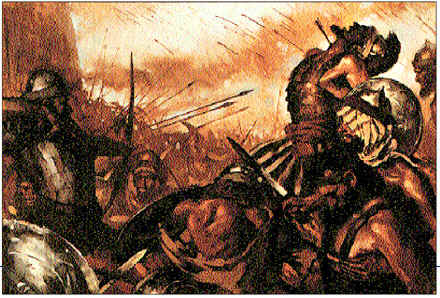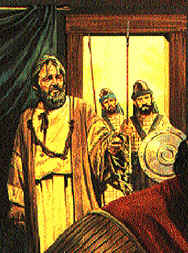The Bible: David and Uriah: Are You Losing Faith?
Reading between the lines: David and Uriah
The story of David, and the books of Samuel in general, are considered by many scholars to be, aesthetically, the best biblical narrative. One reason is the large quantity of speech and dialogue. The Bible tends to avoid formal character portraits, so characters come alive through their speech. Nowhere does this happen better than in the story of David.
Confrontations and sharp exchanges of dialogue abound in the entire story, but we will concentrate on a passage that more subtly shows the differences between three personalities through their speeches and actions. The insights presented here are elaborated further in Meir Steinberg’s book Poetics of Biblical Narrative.
King David, who should have been leading his troops into battle (2 Samuel 11:1), has remained in Jerusalem and committed adultery with Bathsheba, the wife of Uriah the Hittite. Bathsheba has become pregnant. If something isn’t done, Bathsheba will be found guilty of adultery, and killed. David could lose the respect of his citizens and soldiers, and he could also be put to death for his sin.
First, David recalls Uriah from the front, hoping that he will sleep with Bathsheba, assume that the child is his own, and David’s affair will be covered up. Whether or not Uriah heard of David’s adultery, he refused to go home to his wife. Moreover, he bluntly told the king that he (unlike David, the reader might observe) would not enjoy the comforts at home with his wife when it was time to be fighting Israel’s enemies (verse 11).
David now became desperate to have Uriah killed, and this is where we pick up the story. David wrote a message, to be carried by Uriah himself, to Joab: “Put Uriah in the front line where the fighting is fiercest. Then withdraw from him so he will be struck down and die” (verse 15).
David’s action was risky, almost to the point of irrationality. First, since it is likely that several of David’s courtiers knew of his affair, there was a chance that Uriah might also find out. Having had his suspicions aroused, Uriah might open the letter to Joab and foil the plot. Second, the plan was itself perilous. It would involve giving other soldiers an unusual order in such a manner that Uriah wouldn’t hear about it.
Joab carried out the spirit of the plan — ensuring Uriah’s death — by somewhat different means. He besieged the city in such a manner that the men in Uriah’s section would almost certainly come under a fatal assault by the enemy. This made Uriah’s death seem to the Israelites just another war casualty.
 |
| “So while Joab had the city under siege, he put Uriah at a place where he knew the strongest defenders were. When the men of the city came out and fought against Joab, some of the men in David’s army fell; moreover, Uriah the Hittite died” (2 Samuel 11:16-17). Artwork by Andrew Burward-Hoy. |
Joab then sent a messenger to David to tell him what happened. This is what Joab told the messenger:
“When you have finished giving the king this account of the battle, the king’s anger may flare up, and he may ask you, ‘Why did you get so close to the city to fight? Didn’t you know they would shoot arrows from the wall? Who killed Abimelech son of Jerub-Besheth? Didn’t a woman throw an upper millstone on him from the wall, so that he died in Thebez? Why did you get so close to the wall?’ If he asks you this, then say to him, ‘Also, your servant Uriah the Hittite is dead’” (verses 19-21).
Notice how Joab’s message gives us insight into not only Joab but also David. Joab is brutal in his practicality. He knew from his military experience that his method of besieging the city would result in failure and several casualties, but it was the most practical method of eliminating Uriah without causing suspicion. Joab also knew that David, when he heard a straightforward report of the battle, would be angry at what would seem like Joab’s lack of military wisdom.
Articles in “Exploring the Word of God: Historical Books”
|
The way Joab intended, via the messenger, to answer David’s indignant anger was also brutally to the point: “Also, your servant Uriah the Hittite is dead.” David would have understood that Joab’s strange military strategy was not a failure of military judgment but something necessitated by the king’s desire to eliminate Uriah. Joab’s message shows him to be quite prepared to justify his methods to David. He may even, by describing Uriah the Hittite as “your servant,” be scolding David for having given him such an order.
Just as Joab did not obey David’s order precisely, so the messenger took liberties with Joab’s message. The messenger, presumably not realizing that David wanted Uriah killed, could not understand why Joab would want the stupidity of his military maneuvers revealed to the king. So he changed the report. He told the king: “The men overpowered us and came out against us in the open, but we drove them back to the entrance to the city gate. Then the archers shot arrows at your servants from the wall, and some of the king’s men died. Moreover, your servant Uriah the Hittite is dead” (verses 23-24).
In this scenario, rather than the troops having been deliberately placed near the wall vulnerable to attack, the Israelites approached the wall only in the heat of a counterattack against the enemy. David would thus have no reason to ask why the soldiers were near the wall. Fortunately, the messenger mentioned that Uriah was among the casualties, the piece of information David wanted most.
David now sends the messenger back to Joab with an ambiguous message of his own: “Don’t let this upset you; the sword devours one as well as another. Press the attack against the city and destroy it” (verse 25). To a messenger who knew nothing of David’s scheme to kill Uriah, David would seem to be saying: “Don’t worry about this temporary military setback. It could happen to anyone. Just win the next battle.”
To Joab, who is aware that it was the king’s desire for Uriah’s death that necessitated this military setback, and who may not be too happy about it, David’s message could convey an entirely different meaning: “Don’t be angry at me for causing you to suffer a military defeat. If you lost a few good men because of me, you would probably have lost them sooner or later due to the very nature of war.”
The skillful use of dialogue throughout this narrative has brought the characters to life. David’s passion to ensure Uriah’s death led him to give foolish orders. Once that had been accomplished, he became quite philosophical about the numerous other deaths that accompanied it. Such a reaction was out of character for David, who normally displayed the utmost concern for his men. Most certainly, this was a spiritual low point in David’s life.
Joab, however, acted quite characteristically. He employed his usual calculating powers in doing David’s dirty work with ruthless efficiency. He also proved quite capable of letting the king know his disdain for having had to do this particular job.
It is this method of revealing character through dialogue, occurring throughout both books of Samuel, that makes the story of David the artistic height of biblical narrative.
Are You Losing Faith?
Do you feel as though you are drifting further and
further from God? If so, here is what you should do.

Amman is the modern capital of the Hashemite Kingdom of Jordan. Today, it is a bustling city of more than three million people, and one of the major crossroads of the Middle East.
In Bible times, it was also important, although it was not as big as it is today. The Bible tells us that Amman (then known as Rabbah) was the place where King David of Israel sent Uriah the Hittite to certain death. It is an ugly story, but one that teaches us an important lesson.
We read in 2 Samuel 11:1 that David sent Joab to lay siege to Rabbah. David, however, remained in Jerusalem, and there he made a tragic mistake. We have already covered the story, but let’s quickly review it. David saw Bathsheba, the wife of Uriah, one of his trusted officers, bathing, and he lusted after her. Then David committed adultery with Bathsheba, and later she discovered that she was pregnant (verses 2-5).
Then David made the situation even worse. He called Uriah back from the war so Uriah could spend the night with his wife. David hoped Uriah would then think Bathsheba had become pregnant by him. But that didn’t work. Uriah was a loyal soldier who identified with the hardships of the men at the front. He refused to go home to his wife (verse 9).
David could not persuade Uriah to change his mind. So David arranged for Uriah to be sent back to the war. David instructed that Uriah be assigned to the most dangerous part of the battle, and then be abandoned by his men to be killed (verses 14-15). The plan worked. Uriah was killed, probably while storming the old citadel that is now surrounded by modern Amman. So David was able to marry Bathsheba.
Despite this ugly incident, God loved David. He loved him for his courage — David slew Goliath when everyone else was afraid. God loved him for his loyalty — David risked his life to save his sheep from a lion. David was a good shepherd, willing to lay down his life for his sheep. God could identify with that.
So what happened to cause this courageous, loyal, God-fearing man to so tragically betray his faithful servant Uriah? That was not like David. But then, supposedly converted people sometimes do very unconverted things. David had allowed his spiritual condition to deteriorate. God recorded this incident for us, not to embarrass David, but to teach us a lesson: What happened to David could happen — is happening — to some people reading this feature.
David had slipped a long way. This was not just a bad day — a momentary lapse. It is obvious that David had embarked on a course that was leading him further and further from God. Think about it. Adultery and murder are serious sins, but David could have repented when he realized what he had done. But he didn’t repent immediately.
Bathsheba did not know she was pregnant until some time later. David had ample time to come to his senses and acknowledge the sin. But what did he do? He compounded it. Leaving God out of the picture, he tried to cover up the problem, first with subterfuge and then with murder.
David was in serious spiritual trouble. Unfortunately, some who are reading this feature have gotten themselves into the same condition David was in. They, too, are in deep spiritual trouble. They began to live God’s way, but now they are ready to give it up. They started out well, with hope and enthusiasm. But something has happened. The spark is gone.
Are you that way? Are you just going through the motions of living a Christian life? Do you feel hopeless, discouraged, condemned? Are you about to lose out?
If so, you are on the verge of ruining the most wonderful and important relationship that any human could be given — your relationship with God the Father and Jesus Christ our Savior. The tragic thing about all this is that no one is to blame but yourself. You know that, but you don’t know what to do. God knows about your situation, too, and he does know what to do! Look what he did for David.
 |
| “Then Nathan said to David, ‘You are the man!’ Why did you despise the word of the Lord by doing what is evil in his eyes? You struck down Uriah the Hittite with the sword and took his wife to be your own’” (2 Samuel 12:7, 9). |
God was not prepared to give up on David. He must have watched with great concern as David’s spiritual life collapsed. We can only imagine David’s state of mind in those awful weeks or months — his despair, his growing feeling of alienation from God, the hollowness as the Holy Spirit within him began to be quenched.
David did not look for God, so God went looking for him. God sent Nathan the prophet to try to bring David to his senses (2 Samuel 12:1-15). It worked. David heeded Nathan’s correction and repented. He admitted, “I have sinned against the Lord” (verse 13).
God was not about to stand by and let this wonderful man destroy himself spiritually. Think about this if you have allowed yourself to get into David’s condition. Do you feel cut off — that your prayers are going unheard? Are you losing your zeal for God and his way? Do you find yourself drifting back into your old ways and lacking the will to do anything about it? Do you feel that God has lost interest in you, and that you really can’t blame him, given your lack of interest in him?
Then remember how God came looking for David. Also consider Christ’s parable of the lost sheep (Matthew 18:10-14). In it, the shepherd leaves the 99 sheep and goes looking for the one that is lost. Here’s how it ends: “Your Father in heaven is not willing that any of these little ones should be lost” (verse 14).
David was one of those little ones — and so are you. That means that somewhere out there, God, like a shepherd, is looking for you. So do what David did. Admit the problem, whatever it is. And pray. Yes, it’s hard if you have gotten away from it. But don’t be too proud to ask for help.
After David repented, he wrote Psalm 51, which shows how deeply he understood the seriousness of his sins. He realized how badly he had let God down, and now he wanted to be restored to full favor. He prayed: “Create in me a pure heart, O God, and renew a steadfast spirit within me. Do not cast me from your presence or take your Holy Spirit from me” (verses 10-11).
David wanted once more to experience God’s salvation. “Restore to me the joy of your salvation and grant me a willing spirit, to sustain me” (verse 12). He wanted to have back everything he had so nearly thrown away.
Why? Not just for himself. David understood his calling. Notice the next verse: “Then I will teach transgressors your ways, and sinners will turn back to you.” David asked God to restore him to faithful service.
Even if you have lost faith, God won’t give up on you. As Paul tells us, “He who began a good work in you will carry it on to completion until the day of Christ Jesus” (Philippians 1:6). You don’t have to give in to feelings of despair and hopelessness. There is a way out. Ask God to work with you as he did with David.
Author: Jim Herst and Tim Finlay
